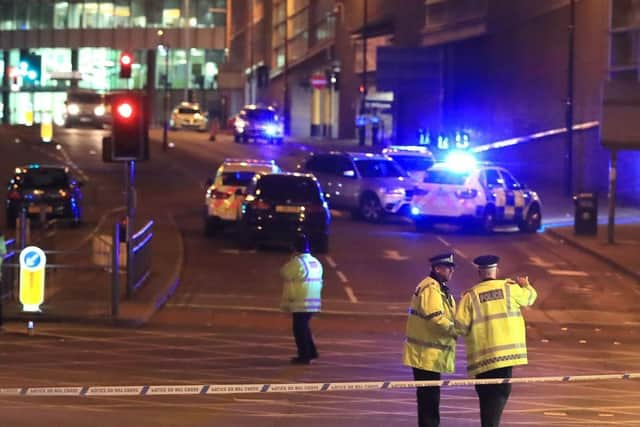PC was in ‘disbelief’ at treatment of Manchester Arena bombing victims – inquiry
and live on Freeview channel 276
Pc Edward Richardson was among the first armed officers to attend the scene and led a sweep of the City Room foyer where Salman Abedi struck at the end of an Ariana Grande concert and murdered 22 people and injured hundreds.
After he concluded no more terrorists were “blatantly obvious”, he updated Greater Manchester Police’s (GMP) force duty officer, Inspector Dale Sexton, who was leading GMP’s initial response from the control room.
Advertisement
Hide AdAdvertisement
Hide AdThe inquiry has heard the dying and injured had to be evacuated on advertising hoardings and there was a lack of medical help with police officers on the scene screaming for paramedics to attend.


Firefighters, trained in first aid and with specialist equipment and stretchers, did not arrive at the scene until two hours after the explosion and only one paramedic entered the blast scene in the first 40 minutes.
Asked by counsel to the inquiry, Paul Greaney QC, about his views on the initial medical response, Pc Richardson said: “It was disbelief what I was looking at. I couldn’t believe what was going on and if I said underneath, inside, I’m sort of flapping, shall we say with regards to what I was looking at (that) would be an understatement.”
Pc Richardson asked Insp Sexton for more ambulances and paramedics to attend. In response Insp Sexton said: “Yes I am trying to get as many NWAS (North West Ambulance Service) down there as possible.”
Advertisement
Hide AdAdvertisement
Hide AdFollowing his sweep of the foyer – about 15 minutes after the blast – Pc Richardson said he considered the possibility of a secondary device but was satisfied the City Room should be treated as a “warm zone” so casualties could be attended to and evacuated by first responders.
He told the inquiry he believed he informed Insp Sexton of that opinion but the inquiry was told no recording of that message had been found. Mr Greaney said the first recorded reference to a “warm zone” was one hour after the explosion when a senior GMP officer who arrived at the scene asked the constable “are you declaring this warm?” and Pc Richardson replied: “Yes.”
Pc Richardson agreed with Pete Weatherby QC, representing the bereaved families, that – whether or not his message was communicated – Insp Sexton could have asked him about zoning but said his colleague was “overwhelmed” with the number of tasks he faced on the night.
“It was just too much for one man,” he added.
The inquiry has heard both the ambulance and fire and rescue services were unable to speak to Insp Sexton as his phone line was swamped.
Advertisement
Hide AdAdvertisement
Hide AdMr Weatherby told Pc Richardson: “The families recognise the difficult and dangerous job you do and the fact that you went as swiftly as you could into an area where you were unsure as to what the threat was, and also that you obviously had casualties and their treatment at the forefront of your mind.”
The inquiry continues on Wednesday.
Thanks for reading. If you value what we do and are able to support us, a digital subscription is just £1 for your first month. Try us today by clicking here